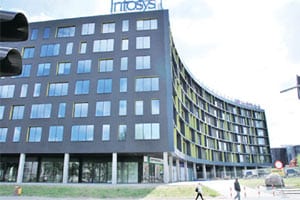Infosys Ltd on Tuesday posted a net profit of Rs 3,030 crore for first quarter of this fiscal, registering a 5 per cent increase year-on-year. Infosys shares surged on Tuesday after the company announced its result for the April-June quarter.
Vishal Sikka, CEO and MD, Infosys said in a statement, “I am very pleased with our performance in the first quarter. Our efforts in redesigning our clients’ experience and our widespread adoption of innovation, both in grassroots and breakthroughs, are starting to bear fruit in large deal wins and in the growth of large clients.”
We collate 5 crucial pointers about Infosys Q1 results
1. Infosys has maintained its annual revenue guidance at 10-12 percent for this financial year — or what it had projected in April. In dollar terms, though, the guidance has been revised upward by 100 basis points. Infosys reported consolidated revenue of Rs 53,319 crore for last fiscal (2014-15) in rupee terms and $8.7 billion in dollar terms, which was 6.4 per cent growth YoY in rupee terms and 5.6 per cent in dollar terms.
2. Infosys also said it kept its rupee-denominated revenue growth view for the business year through March at a range of 10 per cent to 12 per cent. But it raised its outlook in dollar terms to 7.2 per cent to 9.2 per cent, from 6.2 per cent to 8.2 per cent.
3. On a quarterly basis the Q1 revenue growth was 7 per cent which is the highest in 15 quarters in dollar terms. The company said its business volume growth, a key barometer for demand, was up 5.4 percent in the June quarter from the previous three months, the most in nearly five years, bolstered by a surge in demand from clients in the United States, its biggest market.
4. Infosys added 79 clients in April-June, taking its total to 987. Client wins included a multi-year contract from a major German bank for application maintenance services, digital and mobility services, package implementation, and testing services.
5. Attrition of techies in Infosys declined 9.2 per cent to 14.2 per cent in first quarter (April-June) of this fiscal (2015-16) from 23.4 per cent in like period a year ago (2014-15).
With agency inputs


